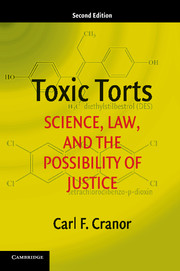Book contents
- Frontmatter
- Dedication
- Contents
- Preface
- Acknowledgments
- 1 The Veil of Science over Tort Law Policy
- 2 Legal Background
- 3 Institutional Concerns about the Supreme Court's Trilogy
- 4 Evidence of Toxicity
- 5 Scientific Reasoning and Some Applications
- 6 Excellent Evidence Makes Bad Law: Pragmatic Barriers to the Discovery of Harm and Fair Admissibility Decisions
- 7 Science and Law in Conflict
- 8 Milward v. Acuity Specialty Products: Toward Clarifying Legal and Scientific Issues
- 9 Enhancing the Possibility of Justice Under Daubert
- 10 What has Daubert Wrought?
- Bibliography
- Index
5 - Scientific Reasoning and Some Applications
Published online by Cambridge University Press: 05 May 2016
- Frontmatter
- Dedication
- Contents
- Preface
- Acknowledgments
- 1 The Veil of Science over Tort Law Policy
- 2 Legal Background
- 3 Institutional Concerns about the Supreme Court's Trilogy
- 4 Evidence of Toxicity
- 5 Scientific Reasoning and Some Applications
- 6 Excellent Evidence Makes Bad Law: Pragmatic Barriers to the Discovery of Harm and Fair Admissibility Decisions
- 7 Science and Law in Conflict
- 8 Milward v. Acuity Specialty Products: Toward Clarifying Legal and Scientific Issues
- 9 Enhancing the Possibility of Justice Under Daubert
- 10 What has Daubert Wrought?
- Bibliography
- Index
Summary
Beyond basic scientific studies there is a concern that courts may not fully understand critical features of scientific reasoning. This is the means by which scientists make inferences from data to conclusions about the toxic properties of substances. These inferences are central to the scientific enterprise, but they have some complexity that may resist easy understanding. In fact, some judges have had a tendency to adopt comparatively simple indicators of reliable scientific reasoning, indicia that must be jettisoned or modified in favor of a more subtle understanding of scientific inferences.
PRINCIPLES OF REASONING UNDERLYING CAUSAL INFERENCE
The reasoning that supports causal inferences is based on nondeductive inferences to the best explanation (introduced in Chapter 3). Such reasoning is both central to routine causal inferences and underlies the reasoning scientists utilized to infer the causal significance of case reports discussed in Chapter 4.
Inferences to the best explanation have a substantial historical pedigree and are widely utilized: by consensus scientific bodies, including the IOM and WHO, by methodologists, by physicians in differentially diagnosing diseases from symptoms, by physicians diagnosing the causes of disease (some call this “diagnostic etiology” – the search for causes of disease), and by fire, airplane, and shuttle accident investigators. It is widely endorsed across many fields and accounts for the particular characteristics of causal inferences to which methodologists and others call attention in good case studies.
Recall that inferences to conclusions are of two kinds: deductive and nondeductive. The defining feature of valid deductive inferences, typical of mathematics and formal logic, is that the conclusion is “guaranteed logically or semantically by the premises: if the premises are true and the argument is valid, the conclusion must be true,” exhibiting a “logically tight” relationship between premises and conclusions.
In contrast, nondeductive inferences to the best explanation are simply those whose conclusions are supported but not guaranteed by their premises. Even if the premises are true, the nondeductive link between premises and conclusions can have varying degrees of strength, unlike a deductive argument. In these arguments if the premises are true, they may offer much to little (or no) support for the conclusion in question. Moreover, the given premises will provide support for different possible conclusions (or as some of the literature puts it, support different explanations).
- Type
- Chapter
- Information
- Toxic TortsScience, Law, and the Possibility of Justice, pp. 129 - 159Publisher: Cambridge University PressPrint publication year: 2016



